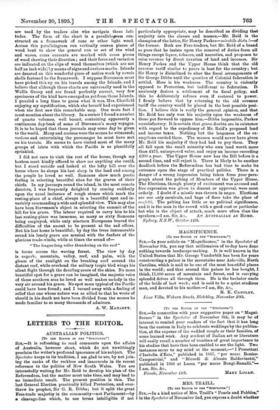LETTERS TO THE EDITOR.
AUSTRALIAN POLITICS.
[To THE EDITOR OF THE "SPECTATOR."] SIR,—It is refreshing to read comments upon the affairs of Australia, however short, which do not unwittingly proclaim the writer's profound ignorance of his subject. The Spectator keeps to its tradition, I am glad to see, by not join- ing the ranks of the reckless and inaccurate in its recent reference to the politics of New South Wales. You are interestedly waiting for Mr. Reid to develop his plan of the Referendum, but the matter must take time, and may lead to no immediate result. The present position is this. The last General Election practically killed Protection, and over- threw its prophet, Sir G. R. Dibbs ; but it split the great Free-trade majority in the community—not Parliament—by a cleavage-line which, to use terms intelligible if not particularly appropriate, may be described as dividing that majority into the classes and masses,—Mr. Reid is the champion of the latter, Sir Henry Parkes—mirabile dicta !—of the former. Both are Free-traders, but Mr. Reid of a brand so pure that he insists upon the removal of duties from all things except liquor, tobacco, and narcotics, and proposes to raise revenue by direct taxation of land and incomes. Sir Henry Parkes and the Upper House think that the old revenue tariff similar to yours is best for the country ; but Sir Henry is disinclined to alter the fiscal arrangements of Sir George Dibbs until the question of Colonial federation is settled. Here is his weakness. The country is violently opposed to Protection, but indifferent to federation. It anxiously desires a settlement of its fiscal policy, and this he deliberately refuses even if restored to power. I firmly believe that by returning to the old revenue tariff the country would be placed in the best possible posi- tion. I believe this is really the general opinion, and that Mr. Reid has only won his majority upon the weakness of those put forward to oppose him,—Dibbs impossible, Parkes unsatisfactory. It is certain that grave doubts are in existence with regard to the expediency of Mr. Reid's proposed land and income taxes. Nothing but the largeness of the ex- emptions carried them. The masses would never have given Mr. Reid his majority if they had had to pay them. They all fall upon the small minority who own land worth more than £475, unimproved value, and enjoy an income exceeding £300 a year. The Upper House now has the Bill before it a second time, and will reject it. There is likely to be another deadlock before the Referendum has had time to make its entrance upon the stage of practical politics. There is a danger of a wrong impression being taken from your para- graph about the pelting of Members of the Upper House. The Elections, though plenty of excitement was aroused and free expression was given to dissent or approval, were most orderly. I doubt if a missile was thrown in anger. Elections are our only carnivals, and bags of flour take the place of con.fetti. The pelting has little or no political significance, and it is the man in the crowd with a good coat or particular hat who is the object of attack, much more often than the










































 Previous page
Previous page